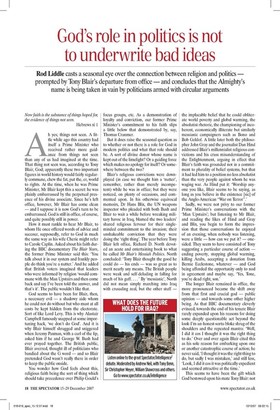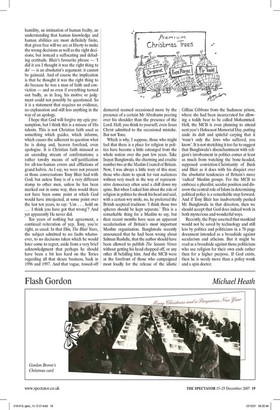God's role in politics is not to underwrite bad ideas
Rod Liddle casts a seasonal eye over the connection between religion and politics — prompted by Tony Blair's departure from office — and concludes that the Almighty's name is being taken in vain by politicians armed with circular arguments Now faith is the substance of things hoped for the evidence of things not seen.
Hebrews xi 1 Ah yes; things not seen. A little while ago this country had itself a Prime Minister who received rather more guidance from things not seen than any of us had imagined at the time. That thing not seen was, according to Tony Blair, God; apparently these two important figures in world history would fairly regularly commune, chew the fat, put the, er, world to rights. At the time, when he was Prime Minister, Mr Blair kept this a secret: he was plainly embarrassed by the perpetual presence of his divine associate. Since he's left office, however, Mr Blair has come clean — and I suppose it is now God's turn to be embarrassed. God is still in office, of course, and quite possibly still in power.
How it must rankle to hear Mr Blair, to whom He once offered words of advice and succour, supposedly, refer to God in much the same way as his wife Cherie might refer to Carole Caplin. Asked about his faith during the BBC documentary The Blair Years, the former Prime Minister said this: 'You talk about it in our system and frankly people do think you're a nutter.' And he added that British voters imagined that leaders who were informed by religion 'would commune with the Man Upstairs and then come back and say I've been told the answer, and that's it'. The public wouldn't like that.
God seems to have been for Blair, then, a necessary evil — a shadowy aide whom he could not do without but who must at all costs be kept hidden from the electorate. Sort of like Lord Levy. This is why Alastair Campbell famously snapped at some importuning hack, 'we don't do God'. And it is why Blair himself shrugged and sniggered when Jeremy Paxman, with a curl of the lip, asked him if he and George W. Bush had ever prayed together. The British public, Blair averred, thought ill of politicians who bandied about the G word — and so Blair pretended God wasn't really there in order to keep the public onside.
You wonder how God feels about this, religious faith being the sort of thing which should take precedence over Philip Gould's focus groups, etc. As a demonstration of loyalty and conviction, our former Prime Minister's commitment to his faith slips a little below that demonstrated by, say, Thomas Cranmer.
But it does raise the seasonal question as to whether or not there is a role for God in modern politics and what that role should be. A sort of divine donor whose name is kept out of the limelight? Or a guiding force which makes no apology for itself? Or somewhere between the two?
Blair's religious convictions were downplayed (in case we thought him a 'nutter', remember, rather than merely incompetent) while he was in office; but they were noticed, on plenty of occasions, and commented upon. In his otherwise equivocal memoirs, Dr Hans Blix, the UN weapons inspector who pleaded with both Bush and Blair to wait a while before wreaking military havoc in Iraq, blamed the two leaders' shared religious fervour for their singleminded commitment to the invasion; their unshakeable conviction that they were doing the 'right thing'. The year before Tony Blair left office, Richard D. North devoted an acute and entertaining book to what he called Mr Blair's Messiah Politics. North concluded: 'Tony Blair thought the good he could do — his ends — was so great as to merit nearly any means. The British people were weak and self-deluding in falling for much of his guff....' By 'messianic', North did not mean simply marching into Iraq with crusading zeal, but the other stuff — the implacable belief that he could obliterate world poverty and global warming, the absolutist rhetoric, the championing of incoherent, economically illiterate but similarly messianic campaigners such as Bono and Bob Geldof. A little later both the philosopher John Gray and the journalist Dan Hind addressed Blair's millennialist religious convictions and his crass misunderstanding of the Enlightenment, arguing in effect that Blair's faith was grounded not in a commitment to plurality of belief systems, but that it had led him to a position no less absolutist than the very people against whom he was waging war. As Hind put it: 'Worship anyone you like, Blair seems to be saying, as long as you believe in the existence [sic] of the Anglo-American "War on Terror".'
Sadly, we were not privy to our former Prime Minister's conversations with the 'Man Upstairs'; but listening to Mr Blair, and reading the likes of Hind and Gray and Blix, you begin to form the impression that those conversations he enjoyed of an evening, when nobody was listening, were a little — how can we put it? — onesided. They seem to have consisted of Tony suggesting a particular course of action — ending poverty, stopping global warming, killing Arabs, accepting a donation from Bernie Ecclestone, whatever — and God being afforded the opportunity only to nod in agreement and maybe say, 'Yes, Tone, you're dead right, son.'
The longer Blair remained in office, the more pronounced became the shift away from that first and crucial god — public opinion — and towards some other higher being. As that BBC documentary cleverly evinced, towards the end of his tenure Blair rarely expanded upon his reasons for doing some deeply questionable act beyond the look-I'm-an-honest-sorta-bloke shrug of the shoulders and the repeated mantra: 'Well, I did it cos I thought it was the right thing to do.' Over and over again Blair cited this as his sole reason for embarking upon one or another catastrophic course of action; he never said, 'I thought it was the right thing to do, but sadly I was mistaken,' and still less, 'Look, I did it cos it was politically expedient and seemed attractive at the time.'
This seems to have been the gift which God bestowed upon his mate Tony Blair: not humility, an intimation of human frailty, an understanding that human knowledge and human abilities are most definitely finite, that given free will we are at liberty to make the wrong decisions as well as the right decisions, but instead a suffocating and deluding certitude. Blair's favourite phrase — 'I did it cos I thought it was the right thing to do' — is an absolutist's argument: it cannot be gainsaid. And of course the implication is that he thought it was the right thing to do because he was a man of faith and conviction — and so even if everything turned out badly, as in Iraq, his motive or judgment could not possibly be questioned. So it is a statement that requires no evidence, no explanation and still less anything in the way of an apology.
I hope that God will forgive my epic presumption, but I think this is a misuse of His talents. This is not Christian faith used as something which guides, which informs, which causes the adherent to question what he is doing and, heaven forefend, even apologise. It is Christian faith misused as an unending stream of confirmations; a rather tawdry means of self-justification for all-too-human errors and afflictions of grand hubris. As I say, we were not present at those conversations Tony Blair had with God; but unless Tony is of a very different stamp to other men, unless he has been marked out in some way, then would there not have been some point at which God would have interjected, at some point over the last ten years, to say: 'Um . . . hold on ... I think you have got that wrong'? And yet apparently He never did.
Ten years of nothing but agreement, a continual reiteration of yep, Tony, you're right, as usual. In that film, The Blair Years, the subject admitted to no faults whatsoever, to no decisions taken which he would later come to regret, aside from a very brief acknowledgment that perhaps he should have been a bit less hard on the Tories regarding all that sleaze business, back in 1996 and 1997. And that vague, tossed-off demurral seemed occasioned more by the presence of a certain Mr Abrahams peering over his shoulder than the presence of the Lord. Hell, you think to yourself, even Jesus Christ admitted to the occasional mistake. But not Tone.
Which is why, I suppose, those who might feel that there is a place for religion in politics have become a little estranged from the whole notion over the past few years. Take Inayat Bunglawala, the charming and erudite number two at the Muslim Council of Britain. Now, I was always a little wary of this man; those who claim to speak for vast audiences without very much in the way of representative democracy often send a chill down my spine. But when I asked him about the role of religion in politics he shook his head and said, with a certain wry smile, no, he preferred the British sceptical tradition: 'I think those two spheres should be kept separate.' This is a remarkable thing for a Muslim to say, but then recent months have seen an apparent secularisation of Britain's most important Muslim organisation. Bunglawala recently announced that he had been wrong about Salman Rushdie, that the author should have been allowed to publish The Satanic Verses without getting his head chopped off, or any other ill befalling him And the MCB were at the forefront of those who campaigned most loudly for the release of the idiotic Gillian Gibbons from the Sudanese prison, where she had been incarcerated for allowing a teddy bear to be called Mohammed. Hell, the MCB is even planning to attend next year's Holocaust Memorial Day, putting aside its daft and spiteful carping that it 'wasn't only the Jews who suffered, you know'. It is not stretching it too far to suggest that Bunglawala's disenchantment with religion's involvement in politics comes at least as much from watching the bone-headed, supposed conviction-Christianity of Bush and Blair as it does with his disquiet over the absolutist tendencies of Britain's more 'radical' Muslim groups. For the MCB to embrace a pluralist, secular position and disavow the central role of Islam in determining political policy is a remarkable step forward. And if Tony Blair has inadvertently pushed Mr Bunglawala in that direction, then we should accept that God does indeed work in both mysterious and wonderful ways.
Recently, the Pope asserted that mankind would not be saved by technology and still less by politics and politicians in a 78-page document intended as a broadside against secularism and atheism. But it might be read as a broadside against those politicians who use religion for their own ends rather than for a higher purpose. If God exists, then he is surely more than a policy wonk and a spin doctor.


































































































 Previous page
Previous page